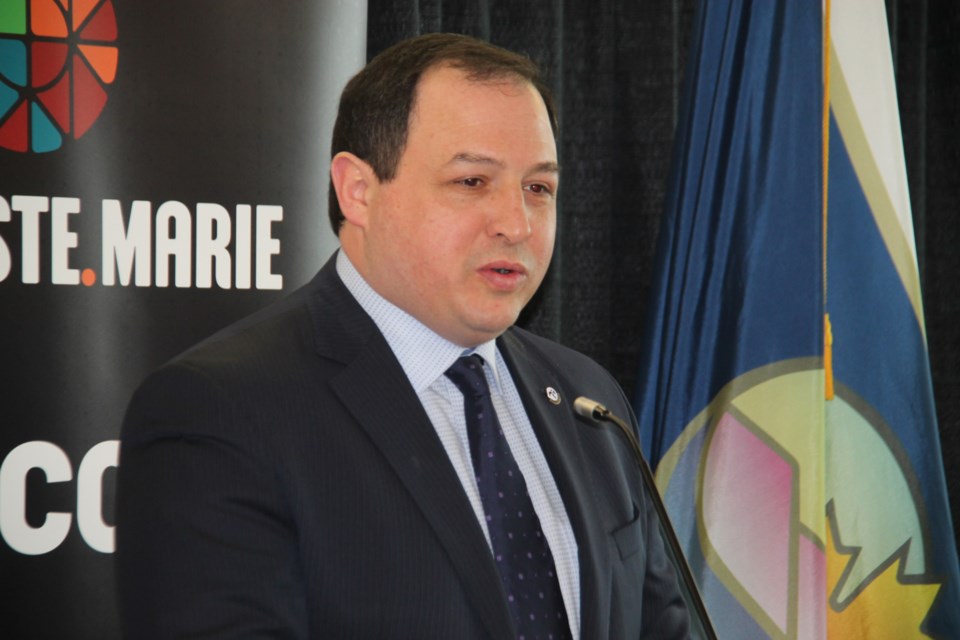COVID-19 pandemic aside, there are some good things happening in northern Ontario communities (such as downtown revitalization and plans for a new twin pad arena, in Sault Ste. Marie’s case).
However, those developments are being overshadowed by widespread drug addiction and crime.
That from Sault Mayor Christian Provenzano in a virtual address to northern Ontario media Tuesday.
Provenzano was joined by Thunder Bay Mayor Bill Mauro, Greater Sudbury Mayor Brian Bigger, North Bay Mayor Al McDonald and Timmins Mayor George Pirie, his partners within the Northern Ontario Large Urban Mayor’s (NOLUM) group.
Provenzano said he and the Sault Ste. Marie Police Service are concerned that, under current laws, “individuals who are being picked up frequently for violent crime and serious crime are being very quickly discharged on recognizance. It takes the deterrence effect of the justice system and essentially negates it. We have some concern that there are people that should be being held (in custody) are not being held, so my colleagues are going to do some advocacy on that.”
“I have never seen a month like the month of April, and the time between April and May, in all the activity in the community that relates to crime, to serious crime,” said Provenzano, who serves on the Sault Ste. Marie Police Services Board.
“From my perspective, there’s a fundamental issue with the ‘defund the police’ movement in that I understand and agree with the principle that funding needs to be provided to address the root problems (drug use) and that police services are addressing the symptoms of the problems (crime related to drug use)...but you can’t take resources away from the service that is required to address the symptoms until you’ve actually put proper resources into addressing the cause,” Provenzano said.
While Provenzano and his NOLUM colleagues intend to lobby the federal government to deal with the ‘catch and release’ phenomenon, the mayors also agree opioid use is the biggest social problem northern Ontario is dealing with, the leaders calling for more provincial and federal government funding to deal with rampant opioid use and its devastating effect on northern communities.
A letter from the five northern mayors will be forwarded to Premier Doug Ford and Prime Minister Justin Trudeau, asking for a meeting and provincial and federal government help in addressing the opioid crisis, including funding for stepped up treatment programs and housing for those struggling with opioid addictions.
“The most pressing issue that all of us face, and the underlying issue, is the opioid endemic and the addictions issues that are prevalent in all of our communities, and you can see through the data, information and facts available by the provincial government that those problems are more acute in northern Ontario,” Provenzano said.
“They have ancillary effects (such as crime).”
“I’ve spoken to our own police chief here (Sault Ste. Marie Police Service Chief Hugh Stevenson) consistently over the last number of months because we have seen an increase in crime in our community and my colleagues have indicated they are having the same experience...to different degrees they all relate to an underlying cause, which is addictions.”
Stating those who have addictions are suffering from illness, not to be treated as criminals but cared for while police work to apprehend those who develop and distribute narcotics, Provenzano said “we need immediate help, specifically designed for northern Ontario.”
“We need additional funds for northern Ontario so that our communities can start to work through the very significant challenges that we have. Those are conversations that have to be had,” Provenzano said, pointing to data released by the Ontario Drug Policy Research Network May 19 which showed fatal opioid overdoses in the province were up more than 75 per cent after COVID-19 struck in 2020, compared to 2019.
That data, Provenzano said, shows more people per every 100,000 are dying in northern Ontario compared to elsewhere in the province.
The mayor said the City of Sault Ste. Marie has been working hard with local health care and social services stakeholders in combating the opioid problem.
“(However) our capacity to solve these problems (due to the nature and extent of them) are limited. It’s clear, when you look at the data year over year, that the problem isn’t getting better. We’re not being successful (referring to Sault Ste. Marie) in finding the care and helping develop the solutions that the magnitude of the problem requires. We need help from the province, we need help from the feds.”
“We’re going to continue to lose more lives (without extra help from the senior levels of government).”
In an encouraging sign toward addressing the drug use problem in Sault Ste. Marie, the Ontario government, on May 27, announced $343,000 in ongoing operational funding for a new ‘community-based addictions services centre’ or a site for ‘residential withdrawal management services’ for the Sault, a major step toward Sault Area Hospital’s request to the province for such a facility to be located in Sault Ste. Marie, first raised in early 2018.
Details regarding the new 20-bed site and its eventual opening will be released in a few weeks.
